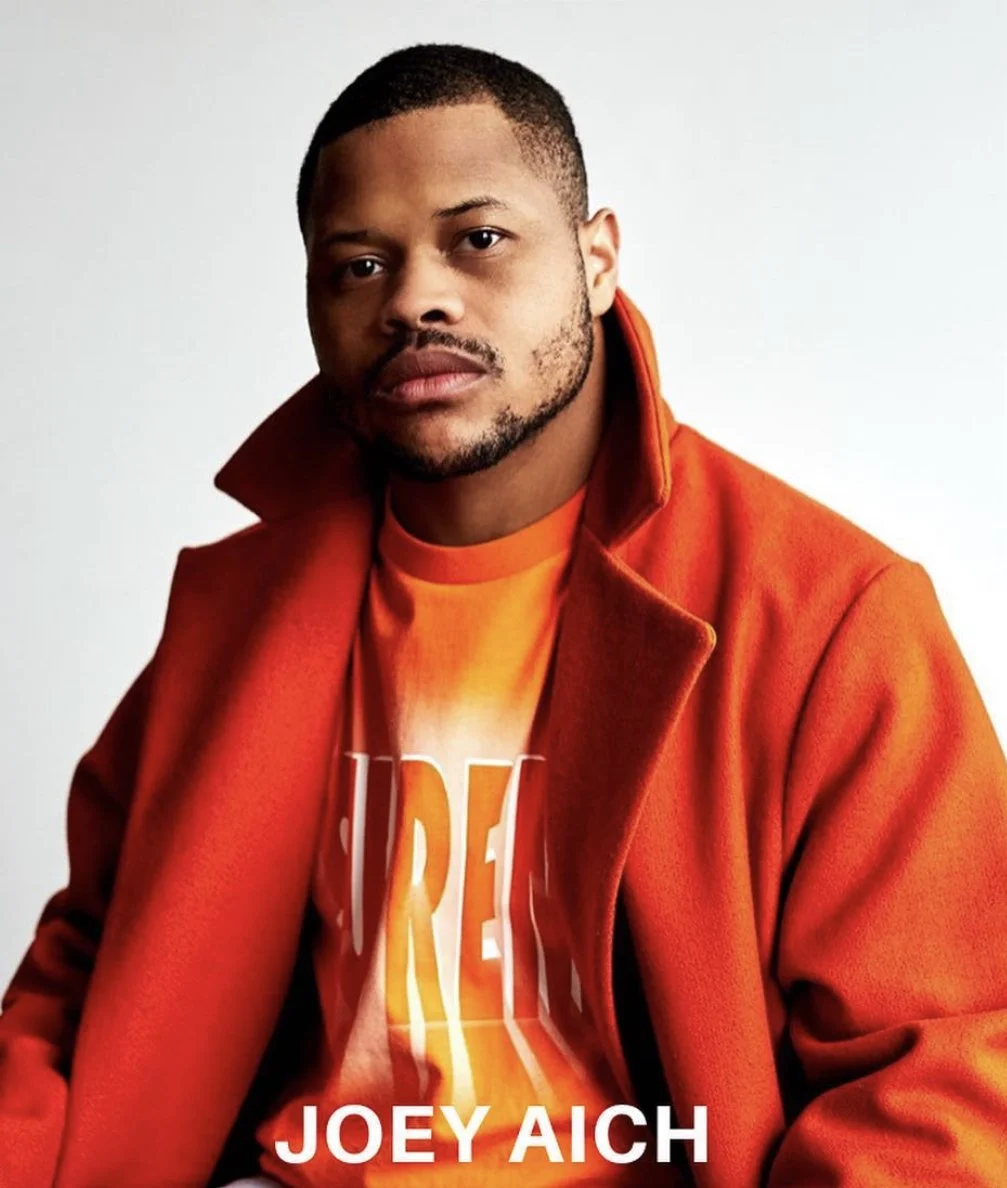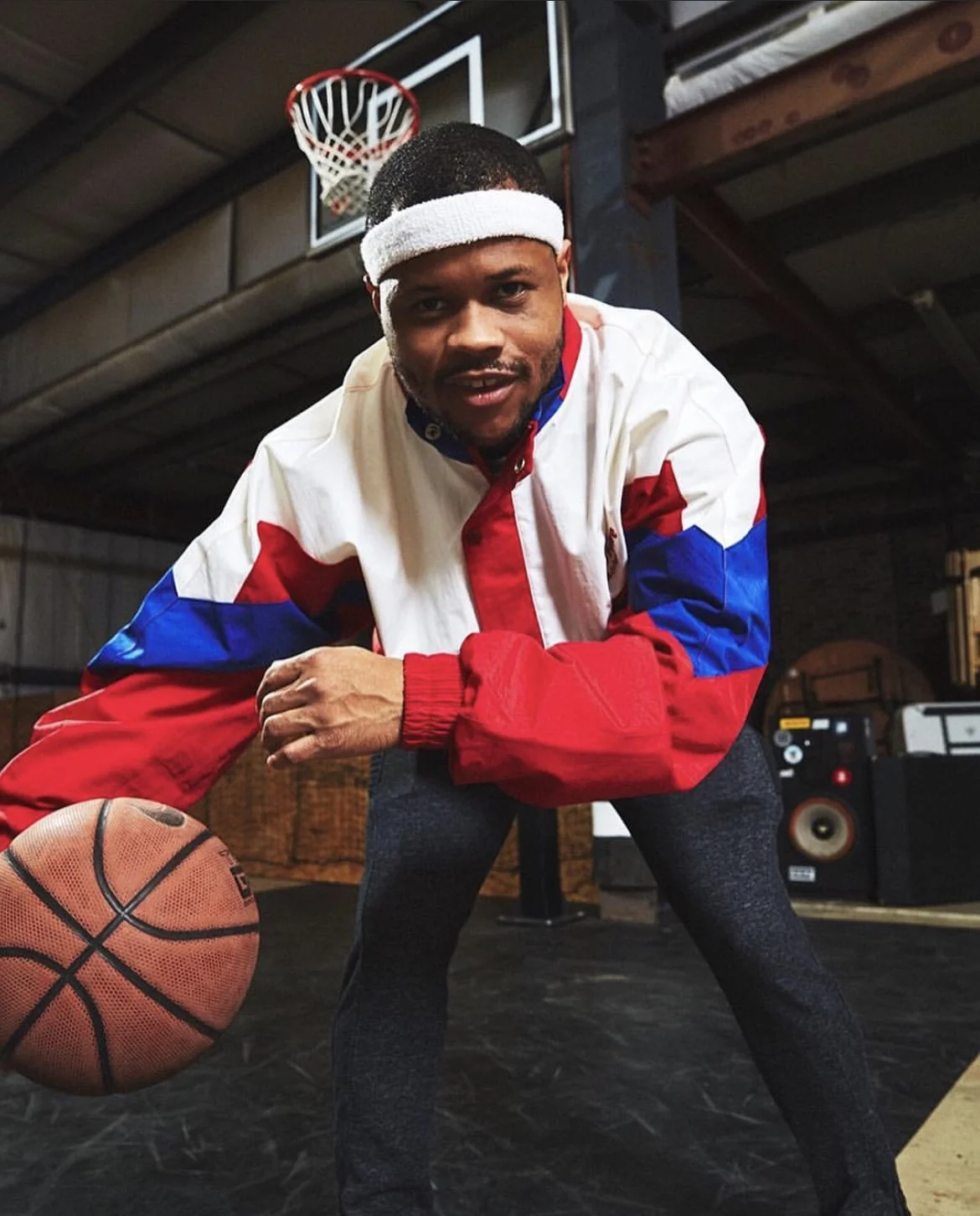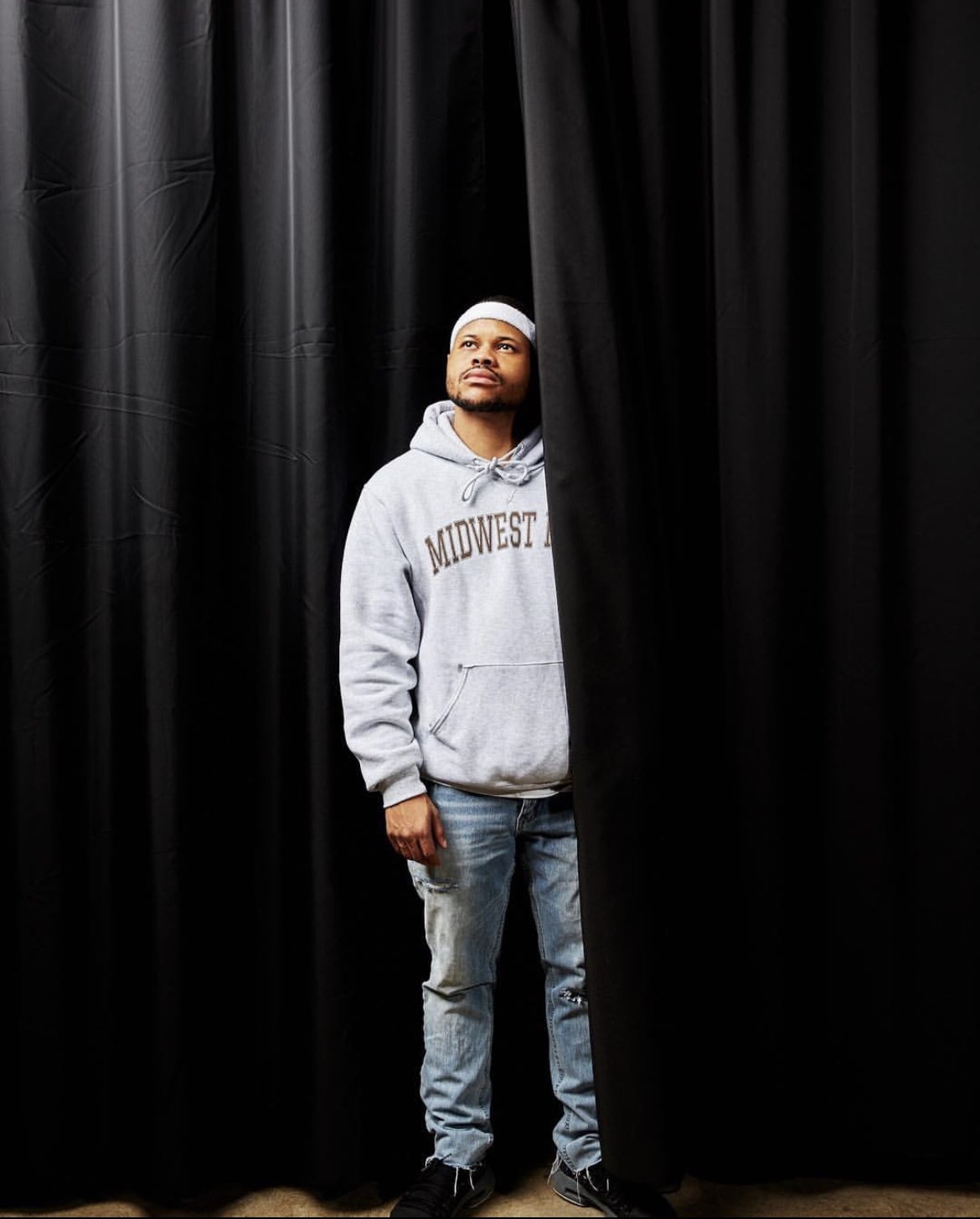MIDWEST KID
Welcome to the archives. This week, in celebration of his midwest tour—we honor the glory of rapper Joey Aich by revisiting his 2019 Culture Jock cover story shot by Michael Thornburg, where he explains the importance of doing things your own way.
In a way this all feels metaphorical.
In Hip-Hop, the MidWest is frequently neglected. Psychologists suggest the middle child is most likely to be overlooked by their families. And Columbus rapper, Joey Aich happens to fall under both.
Alexa, play ‘Middle Child’ by J. Cole.
Joey Aich, the ‘Aich’ pronounced like the first letter of his last name, Holbert, is on a mission to reclaim MidWest's position as a contender in Hip-Hop/Rap genre. The Cleveland native follows the city’s reputation of producing influential rap artists like Bone Thugs-N-Harmony, Kid Cudi, King Chip. Aich’s sound is distinctive and may remind listeners of early 90’s rap artists like, The Pharcyde and Mobb Deep. It’s February 2019, a week before his 25th birthday, the artist sets aside some time for a phone call with me about music and defining what it means to be a committed artist.
“There’s been times when people have called and I’m right in the middle of writing a verse and I’m like, ‘Yo call me back’ and I’ll hang up before they can even say anything,” Holbert laughs.
He’d just left his “9-5” job and was in his car heading to his career: The studio.
“Having a phone is literally the best thing ever. Boom, when I’m the car, I’ll hit the voice memo, do opening bars so I don’t forget,” he shares as a method to keep up with the songs he hears in his head. “At work. I write on Post-it notes, scribble ideas down. I have Post-it notes everywhere, with to-do lists, project ideas, cover art,” he laughs, “Huge Post-it guy.”
Holbert claims that he has been rapping for the past 8 years, but it hadn’t been until his decision 3 years ago that he wanted to be a rapper, he began putting his all into the craft. A tough decision, to gamble his chances on the unbeaten trail.
“It seems we only root for the underdog after he’s been crowned King,” he says, about the hesitance he received from friends and family when he started committing to rapping, “People want to know there is a happy ending to their struggles, so they project that worry onto everyone else.”
“I can spark change from inside a cubicle, but if it’s money that is all to offer, I rather be broke.”
Holbert, finds the gamble as a dream worth finding for, especially in moments leading up to new project ands music releases. Yet, like every artists, can be riddled with first night butterflies at the eve of a music drop.
“I remember I was talking to my friend, Zoe, she’s a painter, in Columbus. We were talking about the differences in our art. I am, like, ‘how can you guys be in the same room with people looking at your art and you can’t say anything about?’ That has to be terrifying. No one really talks in art exhibit. Whereas, when I’m on stage I can tell if a crowd likes me. Now, I have this feeling when I release music. It’s out of my control. I made the art, but it’s, like, there is nothing in my control.”
He continues,“If it comes out at midnight, from 12:00 am to about 12:45 am I’m happy it’s out. Then immediately it’s like, shit, ‘I don’t know what people think. There are times I’m like, ‘I don’t care if anybody likes this song. I like this song,’ but I do find myself getting down if my message doesn’t come across or I don’t get enough views.”
“I’m not gonna lie, sometimes I’ve been tempted to play the game. I think people see stuff that has worked for other people and copy thinking that, that method is going to work them. I mean that’s cool, it works for some people, but that’s not me,” he says.
“If I am going to do it, I have to be me. Life isn’t about winning, it’s about leveling up.”
Next week, Holbert would be headlining a show in Akron, Ohio a part of the Ohio Grand Prix Tour, featuring ISAI and OG Vern. When I ask him where he finds the stamina he tells me, “I’m inspired by uncertainty. The potential. Like, this is what I can become.”
He’s idealistic. A true Midwesterner.
The night is biting cold. It’s a cold that’s insolent and familiar to anyone north of Columbus, Ohio. Winds whip at the face as if to antagonize dreams of warmer weather as you muscle through with a clenched jaw. Tonight’s refuge is inside Annabell’s, an Akron dive bar and music hall, that would be hosting the Ohio Grand Prix Tour, headlining Joey Aich. Before music halls are booked and stadiums, sold out, this is where the music begins: the dive bars, the basements, the wherever-you-can-make-it’s. These are the gigs that have shaped foundations of all our favorite artists’ career. In 2016, Lady Gaga even did a small promotional tour called, Dive Bar Tour, paying tribute to her early Pop star roots.
Inside, Holbert, waits for me alone in a booth, coincidentally positioned under a gold light, illuminating just him in the dim lighted bar. Even off the stage, he finds his spotlight. He wears a grey sweatshirt, that says: MIDWEST KIDS and a green beanie with the word LEGEND in bold, both pieces designed by his older brother, Ben. He drinks a Pabst Blue Ribbon beer, speaks confidently and stays engaged. He’s handsomely refreshing. He has a face reminiscent of early 90’s LL Cool J’s dimples and nice smile, it feels polar to most of today’s current rappers bathe-less swagger. It’s hard to ignore his presence; It’s undeniable to feel that you’re within the presence of the next big thing, a well kept secret, itching to fall of someone’s tongue.
“People always joke on the ‘link-in-bio’ SoundCloud rapper. But I embrace it. People are the first to jump up when they get away from it and get big. They don’t recognize the work,” says Holbert.
“I feel like a lot of rappers don’t claim rap anymore. They want to be known as artists or musicians because for so long Rap had been talked down, like it was low-brow. I am rapper. We are rappers. It has to be taken seriously. It’s black art. It’s a brand in itself,” says Holbert.
Holbert and I are joined by his friend and producer, Brandon Freeman aka DJ Be Free. Be Free is quiet but intentional. Inquisitive by nature, he savors every word, choosing to only speak when his opinions matter.
“Image is everything. You have to justify and prove it. It’s weird. There are people from inner city, like, you have it good,” says Be Free. “ People listen to what they relate to and understand. But at the end of the day, inner city to Suburb, if it’s good music, it’s good music.”
When I ask them about how they sort through the politics of music and “cancel” culture, a phenomenon in which a mass group of people withdraw their support of a misbehaving public figure, Holbert chimes that in cases such as R&B singer, R. Kelly’s, who was recently dropped Sony music amidst resuscitation of his infamous history as serial sexual predator, he deems “cancelling” is a trend justified.
“It was always a joke, then I watched the doc and was like nah. To know all of that is recorded in his music, I can’t. If you’re putting remixes to ignition in a playlist, you are actively supporting at that moment,” he pauses, then resumes, “That will never get any of my support. ever.”
Slowly, a crowd starts drifting in, each dressed in the current uniform; Designer sweatshirt, cargo pants and a camera bag, slung across the chest. It all feels nostalgic, like going to your friend’s first house concert. It might’ve lacked glamor but you all shared a confidence in knowing you were at the best show in town. The front door continues to swing open and close, letting in a shrill winter air that nearly extinguishes the heat inside. Holbert, intentionally, neglects his environment, appearing uninterested in who may be coming and going. I ask Holbert how it feels to become Joey Aich on stage he says, “I feel at home. Sometimes I black out. I’m not Joseph Holbert, I’m not Joey Aich. I’m in an entirely different place.”
DJ Be Free, who’d been rather recluse for the majority of the night, nods in agreement.
“You know when you hear a crowd, during that pause when I cut the music and they chant the words back. I’m in a whole other zone. I’m right there with him [Joey] at the top of the mountain.”
The party is in the basement.
Tonight, the concert stage is ground level, composing an intimate setting that is divergent to the typical rap concert. In the rear of the concert hall, Ben is setting a merchandise table and patrons scoot between the bar and pool tables. In a corner, Holbert, ready for game time, stretches a white sweatband around his head. Joey Aich has just arrived.
If you paid attention closely, it became apparent that I would have the privilege of watching two types of performances: The crowd and the artist. Audiences are pulled to concerts to celebrate music, but it also comes with the safety to get lost in the crowd. Tonight, the crowd's shuffling turned out to be a dance to avoid attention. They would stand close but not too close. Next to walls, out of center. Ironic, that a room of full people, that’ve gathered to watch others perform, would all be too anxious standing to watch that person perform. It’s hard not to wonder if social media has made us so self-aware of ourselves, that we are unable to be let go and be free in moments that call for it most. A place in which a crowd pays to watch someone perform.
But something changes. Joey Aich is called to the stage and suddenly, the room is snatched by a magnetic pull. Re-grouped and center, the crowd is reeled in with no inhibitions. The awkward conversations come to an end and cellphones retire home to a back-pocket. Finally, someone was shining bright enough to distract them from themselves.
Aich performs as if his veins were electric currents. He exerts the confidence of athletes on game day and asserts his talents with forte. This is how a performer does his job. He demands your attention and allows you to trust a beat and a message. How quick it was to forget that we were all standing eye level.
During his set, an older black man, noticeably a piece of posterity from Hip Hop’s Golden Era, makes his way to the front, to bop along with Joey. He moves his lips along with Joey, actively memorizing lines as to be prepared for the next hook. By all means a stranger, he dances next to stage like a proud parent; he’s amazed. The culture’s been passed down. At the end of the set, the man walks off, still shaking his head in amazement, shouts, “That’s the one. Yeah, that’s the one right there.”
Listen to Joey Aich on Spotify.




